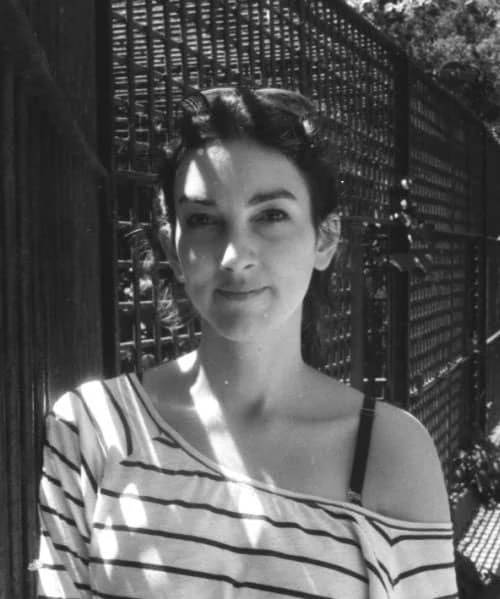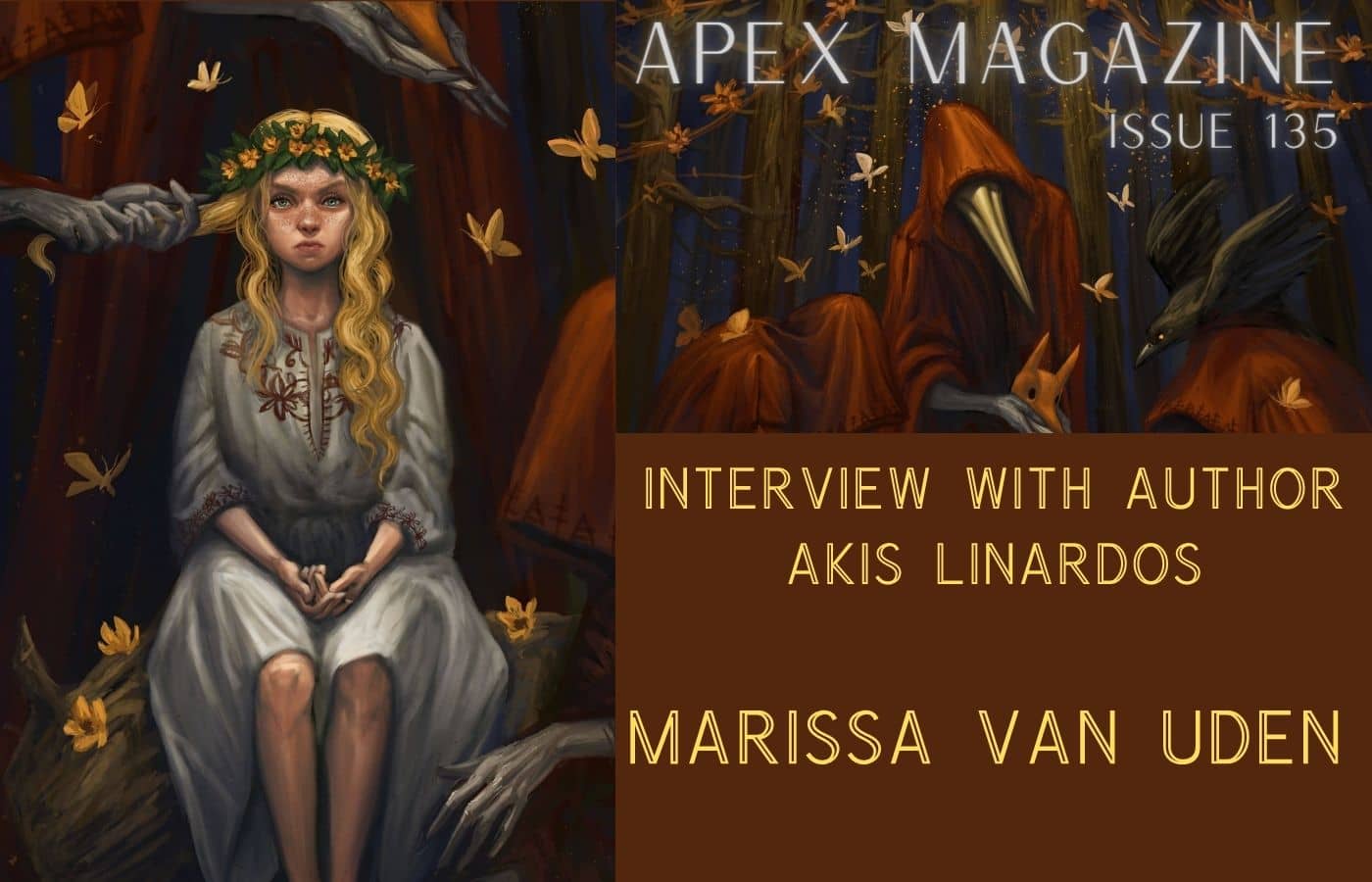
In the beautiful and tragic “Daughter, Mother, Charcoal” by Akis Linardos, a woman grows up in the small confines of her home, repressed by a violent controlling father and a mother who enables him and the patriarchy, despite her own suffering. Akis Linardos does a brilliant job of showing how in an oppressive domestic situation, even though the way to freedom might exist for some people, there can be huge psychological barriers to taking that step beyond, and such barriers are reinforced by those who prefer the cage to exist.
And yet sometimes, when you listen to the song of the faeries beyond the hedge line and ask just the right questions, the way out becomes possible.
Akis Linardos, a genre writer trapped in the body of an AI scientist, draws inspiration from the lands he lived in throughout his research career, including Greece, Spain, Ireland, and Germany among others. His academic exploits began with a biology degree, switched to a chimeric aberration called bioinformatics, then settled on doing research in artificial intelligence. He had a rather hard time sating his thirst for meaning in life. Until he found writing. It sucked him in and never let go.
Marissa van Uden: Thank you so much for joining us, Akis! I adored this story—it’s so dark and yet there is a thread of hope running through it for future generations. To start with, could you tell us the origins of this story? What sparked this idea and inspired you to write it?
Akis Linardos: Like all ideas, this one came from a confluence of different threads. So, I live in a cottage, and there’s a fig tree I like to lie down by and read books. There’s a bush beside it that forms an alcove. One day, I was daydreaming of being a child and growing up here in this cottage, imagining that this bush could easily become my “secret lair” where I would pretend all sorts of things. Then there’s the fireplace, which was inspired by a game called Little Inferno that I was playing at the time—the concept of the game being that you buy stuff just to burn it, and each thing you burn has a unique effect. I thought these were nice little things for a child to escape into, so the only question remaining was, escape from what?
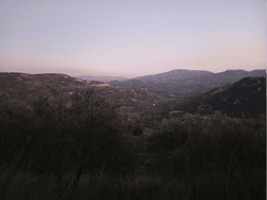 The view from my typical brainstorming walk.
The view from my typical brainstorming walk.
MVU: I love that the setting inspired so much of this, and that’s a great question to spark a story idea. As we see in this story, and in real life, it can take generations to break a pattern of abuse and oppression. By the end of the story, the main character is still trapped in the cycle and repeating the narratives that confine the women of her family to the hearth, and yet she has questioned things just enough to adjust how she tells the stories to her own daughter, giving her a slightly more open door than she ever had herself. How do you see the power of narratives in maintaining the status quo (or in breaking it!), and how important are questioning things and critical thinking to you?
AL: I think my opinions around this topic were largely formed after reading 1984, which gave me more chills than the scariest horror novels. Mob psychology, fundamentalist ideas, and censorship—be it in the scale of a country or the scale of a family—are terrifying to me. As a person, but also as a scientist, I feel it’s of fundamental importance to doubt and to question. It’s the only weapon we have against blind belief.
MVU: I agree! This is why your themes really resonated with me. I was wondering if this story was ever different in earlier drafts: did you always know that the narrator might never quite make it beyond the hedge herself, even though her daughter and aunt were able to escape?
AL: As early as the first draft, the MC fails to escape. The original idea was to symbolize innocence lost, along with her ability to hear the sound of the fairies. Other themes kind of sprouted on the way.
MVU: What was the writing process like for this story? Did it take you long to work on, and did it go through critiques or any heavy revisions?
AL: Surprisingly, of all the stories I’ve written, this is the one story I edited the least (two passes) after writing the first draft. One after receiving some mild editorial feedback from the awesome Alex Woodroe. Somehow, it’s the only one that sold so well, too. Go figure.
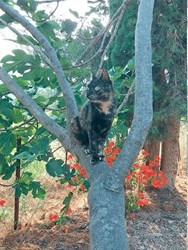 Yuki, my pet companion sitting on top of the fig tree that happens to be my favorite reading spot.
Yuki, my pet companion sitting on top of the fig tree that happens to be my favorite reading spot.
MVU: I feel that magic in this one. Sometimes they just flow! And what about your own origin story: You say you had a rather hard time sating your thirst for meaning in life until you found writing. Was there a particular story you read or moment in life that gave you this revelation? What does storytelling mean to you personally?
AL: The revelation came not from a book but from an RPG called Call of Cthulhu. When I played the storyteller for the first time, something clicked. Storytelling to me is a convenient way to do the magic that the real world won’t allow me to.
MVU: Does your work in AI research and your background in biology tend to influence your writing in terms of subject matter?
AL: Yes, although not as much as you might expect. I did write a couple hard SF stories that are currently looking for a home largely inspired by some high-level concepts of AI. Biology has influenced some of my worldbuilding in fantasy worlds.
MVU: I love asking writers about how they balance their work with their writing life. Do you have set times that you read or write every day, or any particular rituals to help you get in the right headspace for creativity?
AL: I do have a home office, which allows me plenty of spare time to work on my writing. I’m not very organized, so it depends on my mood as to what time I’ll do my writing, although I’m at my most productive around midnight. In terms of rituals, I light up some incense sticks I got from Japan.
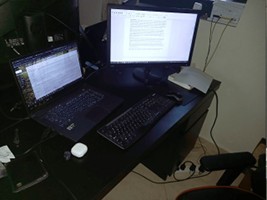 My writing desk as tidy as it gets.
My writing desk as tidy as it gets.
MVU: If we were to interrupt you reading one of your favorite books in your favorite spot, where would you be and what are you reading?
AL: I would be at that fig tree I mentioned and probably reading Neil Gaiman’s Ocean at the End of the Lane or Rothfuss’s Name of the Wind.
MVU: What are you most excited to write about next? Do you have any themes or ideas you’d like to explore and can tell us about? Or any other stories or projects you’d like to share with readers who love this work?
AL: I’m working on this underworld-themed setting, where a girl that can hear the whispers of the dead navigates a maze beneath the mortal world to find her missing mother and escape her abusive necromancer father. The father is also sort of a Hades figure in the world below. I’m thrilled about this story. It started as a short but sparked the beginnings of my first novel titled Death Whispers of Love. In terms of short stories currently available, I have another dark piece readers could pick up, published at the Maul Magazine’s first issue. It’s called “Ink.”
MVU: I loved that story. So beautifully dark story with stunning visuals. Thank you so much for joining us to talk more about this story and your creative process!
AL: The pleasure was all mine. :)









